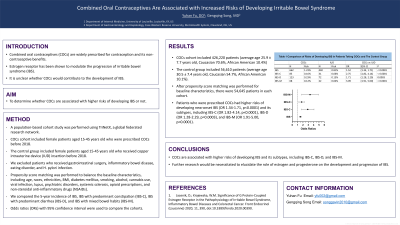Monday Poster Session
Category: Functional Bowel Disease
P1950 - Combined Oral Contraceptives Are Associated With Increased Risks of Developing Irritable Bowel Syndrome
Monday, October 23, 2023
10:30 AM - 4:15 PM PT
Location: Exhibit Hall

Has Audio

Yuhan Fu, DO
University of Louisville
Louisville, KY
Presenting Author(s)
Award: Presidential Poster Award
Yuhan Fu, DO1, Gengqing Song, MD2
1University of Louisville, Louisville, KY; 2MetroHealth Medical Center, Case Western Reserve University, Cleveland, OH
Introduction: Combined oral contraceptives (COCs) are widely prescribed for contraception and its non-contraceptive benefits. Estrogen receptor has been shown to modulate the progression of irritable bowel syndrome (IBS). It is unclear whether COCs would contribute to the development of IBS. The aim of the study was to determine whether COCs are associated with higher risks of developing IBS or not.
Methods: A population-based cohort study was performed using TriNetX, a global federated research network. COCs cohort included female patients aged 15-45 years old who were prescribed COCs before 2018. The control group included female patients aged 15-45 years old who received copper intrauterine device (IUD) insertion before 2018. We excluded patients who received gastrointestinal surgery, inflammatory bowel disease, eating disorder, and H. pyrlori infection. Propensity score matching was performed to balance the baseline characteristics, including age, races, ethnicities, BMI, diabetes mellitus, smoking, alcohol, cannabis use, viral infection, lupus, psychiatric disorders, systemic sclerosis, opioid prescriptions, and non-steroidal anti-inflammatory drugs (NSAIDs). We compared the 5-year incidence of IBS, IBS with predominant constipation (IBS-C), IBS with predominant diarrhea (IBS-D), and IBS with mixed bowel habits (IBS-M). Odds ratios (OR) with 95% confidence interval were used for comparison.
Results: COCs cohort included 426,220 patients (average age 25.9±7.7 years old, Caucasian 70.6%, African American 10.4%) and the control group included 56,610 patients (average age 30.5±7.4 years old, Caucasian 54.7%, African American 10.1%). After propensity score matching was performed for baseline characteristics, there were 54,645 patients in each cohort. Patients who were prescribed COCs had higher risks of developing new-onset IBS (OR 1.34-1.71, p< 0.0001) and its subtypes, including IBS-C (OR 1.82-4.14, p< 0.0001), IBS-D (OR 1.28-2.29, p=0.0003), and IBS-M (OR 1.91-5.00, p< 0.0001) (Table 1, Figure 1).
Discussion: COCs are associated with higher risks of developing IBS and its subtypes, including IBS-C, IBS-D, and IBS-M. Further research would be necessitated to elucidate the role of estrogen and progesterone on the development and progression of IBS.

Disclosures:
Yuhan Fu, DO1, Gengqing Song, MD2. P1950 - Combined Oral Contraceptives Are Associated With Increased Risks of Developing Irritable Bowel Syndrome, ACG 2023 Annual Scientific Meeting Abstracts. Vancouver, BC, Canada: American College of Gastroenterology.
Yuhan Fu, DO1, Gengqing Song, MD2
1University of Louisville, Louisville, KY; 2MetroHealth Medical Center, Case Western Reserve University, Cleveland, OH
Introduction: Combined oral contraceptives (COCs) are widely prescribed for contraception and its non-contraceptive benefits. Estrogen receptor has been shown to modulate the progression of irritable bowel syndrome (IBS). It is unclear whether COCs would contribute to the development of IBS. The aim of the study was to determine whether COCs are associated with higher risks of developing IBS or not.
Methods: A population-based cohort study was performed using TriNetX, a global federated research network. COCs cohort included female patients aged 15-45 years old who were prescribed COCs before 2018. The control group included female patients aged 15-45 years old who received copper intrauterine device (IUD) insertion before 2018. We excluded patients who received gastrointestinal surgery, inflammatory bowel disease, eating disorder, and H. pyrlori infection. Propensity score matching was performed to balance the baseline characteristics, including age, races, ethnicities, BMI, diabetes mellitus, smoking, alcohol, cannabis use, viral infection, lupus, psychiatric disorders, systemic sclerosis, opioid prescriptions, and non-steroidal anti-inflammatory drugs (NSAIDs). We compared the 5-year incidence of IBS, IBS with predominant constipation (IBS-C), IBS with predominant diarrhea (IBS-D), and IBS with mixed bowel habits (IBS-M). Odds ratios (OR) with 95% confidence interval were used for comparison.
Results: COCs cohort included 426,220 patients (average age 25.9±7.7 years old, Caucasian 70.6%, African American 10.4%) and the control group included 56,610 patients (average age 30.5±7.4 years old, Caucasian 54.7%, African American 10.1%). After propensity score matching was performed for baseline characteristics, there were 54,645 patients in each cohort. Patients who were prescribed COCs had higher risks of developing new-onset IBS (OR 1.34-1.71, p< 0.0001) and its subtypes, including IBS-C (OR 1.82-4.14, p< 0.0001), IBS-D (OR 1.28-2.29, p=0.0003), and IBS-M (OR 1.91-5.00, p< 0.0001) (Table 1, Figure 1).
Discussion: COCs are associated with higher risks of developing IBS and its subtypes, including IBS-C, IBS-D, and IBS-M. Further research would be necessitated to elucidate the role of estrogen and progesterone on the development and progression of IBS.

Figure: Risks of developing IBS and its subtypes in patients on combined oral contraceptives
Disclosures:
Yuhan Fu indicated no relevant financial relationships.
Gengqing Song indicated no relevant financial relationships.
Yuhan Fu, DO1, Gengqing Song, MD2. P1950 - Combined Oral Contraceptives Are Associated With Increased Risks of Developing Irritable Bowel Syndrome, ACG 2023 Annual Scientific Meeting Abstracts. Vancouver, BC, Canada: American College of Gastroenterology.


